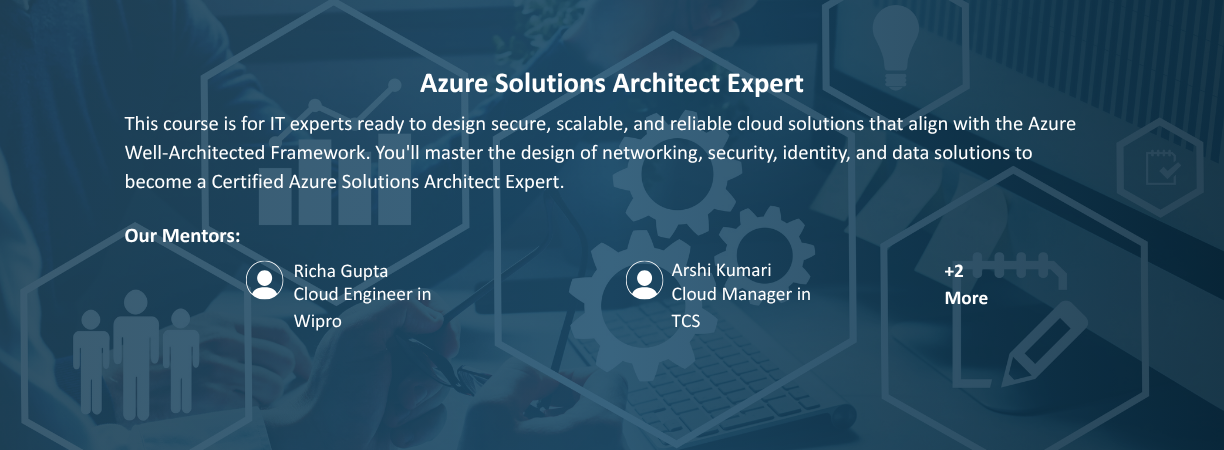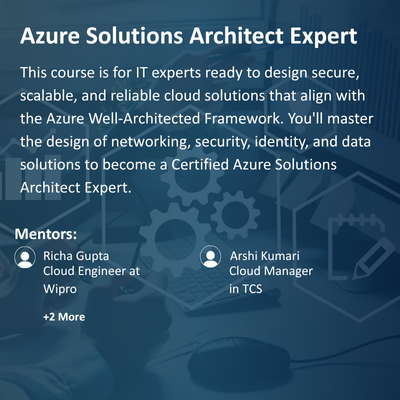



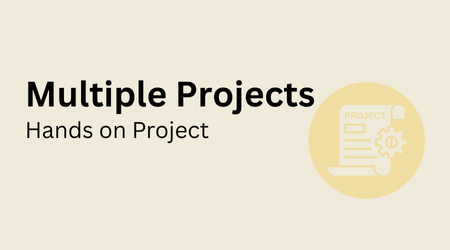



Major Industry Recruiters


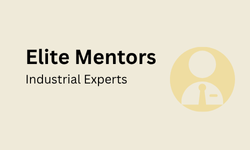



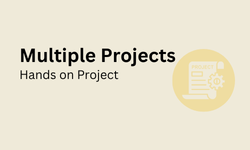

Major Industry Recruiters
Course Description:
The Microsoft Certified: Azure Solutions Architect Expert course prepares candidates to be subject matter experts in designing secure, scalable, and reliable cloud solutions. This role involves advising stakeholders and translating business requirements into technical designs that align with the Azure Well-Architected Framework and Cloud Adoption Framework for Azure.
Successful candidates have advanced experience and knowledge of IT operations, including networking, virtualization, identity, security, business continuity, disaster recovery, data platforms, and governance.
Course Objective:
Upon completion of this training, participants will be able to perform the role of a Solutions Architect by demonstrating the ability to:
1. Design Secure Identity and Governance Solutions
Design and architect advanced identity solutions using Azure Active Directory (Azure AD), including Single Sign-On (SSO), Multi-Factor Authentication (MFA), and Conditional Access policies.
Implement and govern Azure resources by designing Role-Based Access Control (RBAC), enforcing organizational standards using Azure Policy and Management Groups, and managing subscriptions.
Design and configure comprehensive monitoring strategies utilizing Azure Monitor for effective logging, metrics, and alert management across the enterprise.
2. Design Scalable Infrastructure and Application Solutions
Architect and recommend appropriate Azure compute solutions, including Virtual Machines (VMs), container services, and Serverless options, based on specific business requirements.
Design robust networking solutions covering VNet configurations, secure intersite connectivity (VPN Gateway), and traffic management using various load balancing and security services.
Design modern application architectures by incorporating services for messaging, caching, and API integration.
Develop and evaluate strategic cloud migration strategies (lift-and-shift, re-platforming, re-factoring) for existing workloads.
3. Design Data Storage and Integration Solutions
Select and design appropriate relational and non-relational data platforms (e.g., Azure SQL, Azure Cosmos DB, Blob Storage, Azure Files) based on requirements for consistency, scalability, and access patterns.
Design secure and scalable data integration and access strategies, ensuring data platforms meet business requirements for performance and security.
4. Design Business Continuity and Disaster Recovery Solutions
Design and implement high availability (HA) solutions for core infrastructure components using Azure services like Availability Zones and Fault Domains.
Architect and implement backup solutions using Azure Backup for VMs and file shares, aligning with recovery objectives.
Design and configure disaster recovery (DR) strategies utilizing Azure Site Recovery to ensure business continuity across Azure regions.
Course Module:
1. Design Identity, Governance, and Monitoring Solutions
Azure AD for identity (SSO, MFA, Conditional Access), Role-Based Access Control (RBAC), Azure Policy, Management Groups, and Azure Monitor for logging/alerting.
2. Design Infrastructure Solutions
Designing compute (VMs, containers, Serverless), application architecture (messaging, caching, API integration), network connectivity (VNet, VPN Gateway, Load Balancing, security), and migration strategy.
3. Design Data Storage Solutions
Selecting and designing for relational data (Azure SQL, Cosmos DB), non-relational data (Blob, Files), data integration, scalability, and security.
4. Design Business Continuity Solutions
Designing for high availability (Availability Zones, Fault Domains), and implementing backup and disaster recovery solutions (Azure Backup, Azure Site Recovery).
Course Overview:
The training focuses on the key design principles measured by Exam AZ-305: Designing Microsoft Azure Infrastructure Solutions. The course combines lectures with case studies to demonstrate basic architectural design principles across the core pillars of cloud infrastructure.
Key Objective: To teach Azure Solutions Architects how to design infrastructure solutions covering governance, compute, application architecture, storage, data integration, authentication, networks, business continuity, and migrations.
Prerequisite Recommendation: Prior experience as an Azure Administrator (or having passed the AZ-104 exam) is strongly recommended.

Upcoming Batches: Choose as per Your Requirement
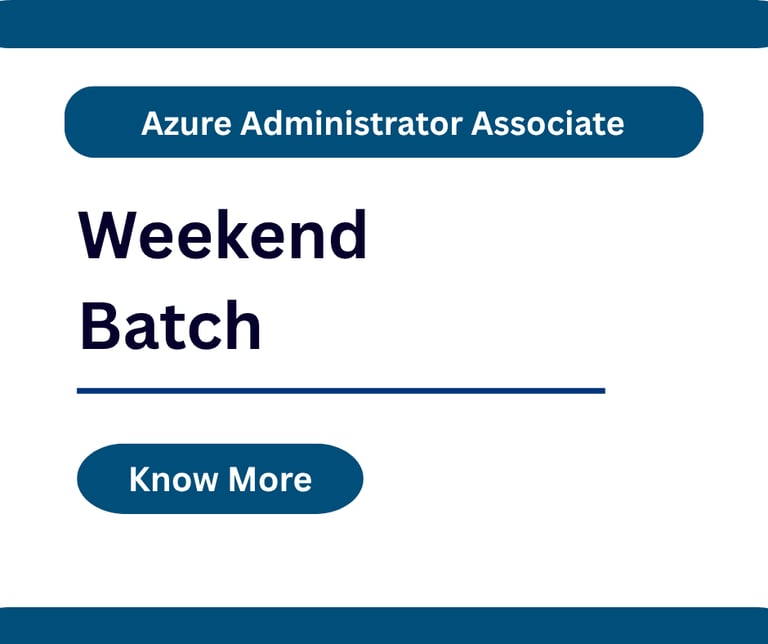

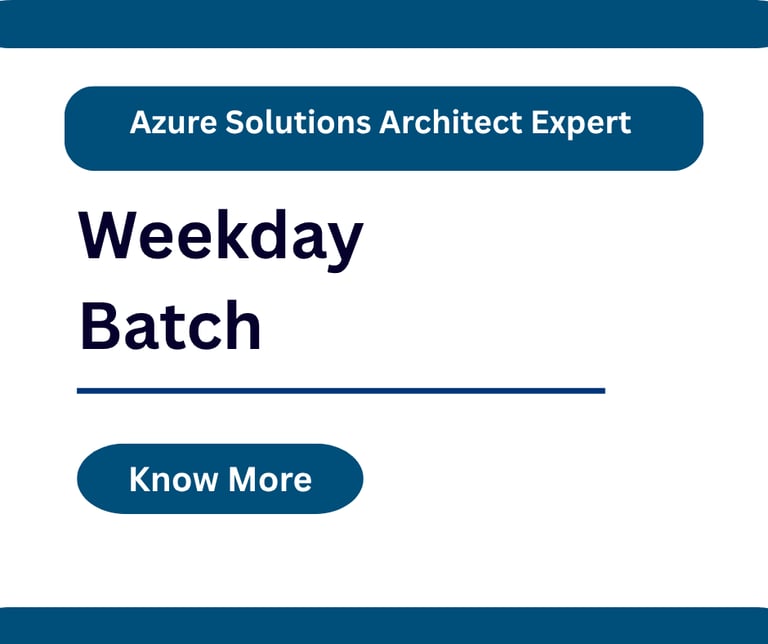

Our Mentors:
Richa Gupta
Cloud Engineer in Wipro
Arshi Kumari
Cloud Manager in TCS
Ahmed Khan
Cloud Engineer in Cognizant
Abhishek Singh
Cloud Engineer in IBM
Our Mentors:
Richa Gupta
Cloud Engineer in Wipro
Aina Rathor
DevOps Engineerex-Deloitte
Ahmed Khan
Coud Engineer in Cognizant
Coud Engineer in IBM
Abhishek Singh
Our Alumni Work at Top Companies
FAQs – Azure Solutions Architect Expert at GIMIT
Who is this Solutions Architect Expert course designed for?
This course is for IT professionals with advanced experience in IT operations, including networking, virtualization, and identity, who wish to become subject matter experts in designing secure, scalable, and reliable cloud solutions on Azure.
What prerequisites are strongly recommended for this training?
Prior experience as an Azure Administrator (equivalent to passing the AZ-104 exam) is strongly recommended, as the course focuses on design rather than foundational administration.
Which exam does this course prepare me for?
This training directly prepares you for Exam AZ-305: Designing Microsoft Azure Infrastructure Solutions, which is the single required exam to earn the Azure Solutions Architect Expert certification.
How does this course differ from the Azure Administrator (AZ-104) course?
The AZ-104 course focuses on implementation and management (doing), while this AZ-305 course focuses on design and architecture (planning, recommending, and advising stakeholders).
What is the "Azure Well-Architected Framework," and how is it used?
The Well-Architected Framework is a set of guiding tenets (cost optimization, operational excellence, performance, security, and reliability) used in the course to ensure all solutions you design are secure, scalable, and reliable.
Does the course cover advanced data storage design?
Yes, the course includes a major domain on designing data solutions, focusing on selecting the appropriate relational and non-relational platforms (e.g., Azure SQL, Cosmos DB, Blob Storage) based on business and technical needs.
What key security and identity design concepts are included?
You will learn to design complex solutions for identity using Azure AD (MFA, Conditional Access) and architect security through proper implementation of RBAC, Azure Policy, and management groups.
How is disaster recovery addressed in the training?
The course teaches you to design comprehensive Business Continuity solutions, including implementing High Availability (HA) using Availability Zones and architecting Disaster Recovery (DR) using Azure Site Recovery.
What is the learning format—is it theoretical or practical?
The course combines in-depth lectures and real-world case studies to demonstrate how to translate abstract business requirements into concrete, deployable Azure designs.
What role does this certification enable me to pursue? Achieving this certification validates your skills for high-level, strategic roles such as Cloud Solutions Architect, Senior Cloud Consultant, or Cloud Team Lead.

